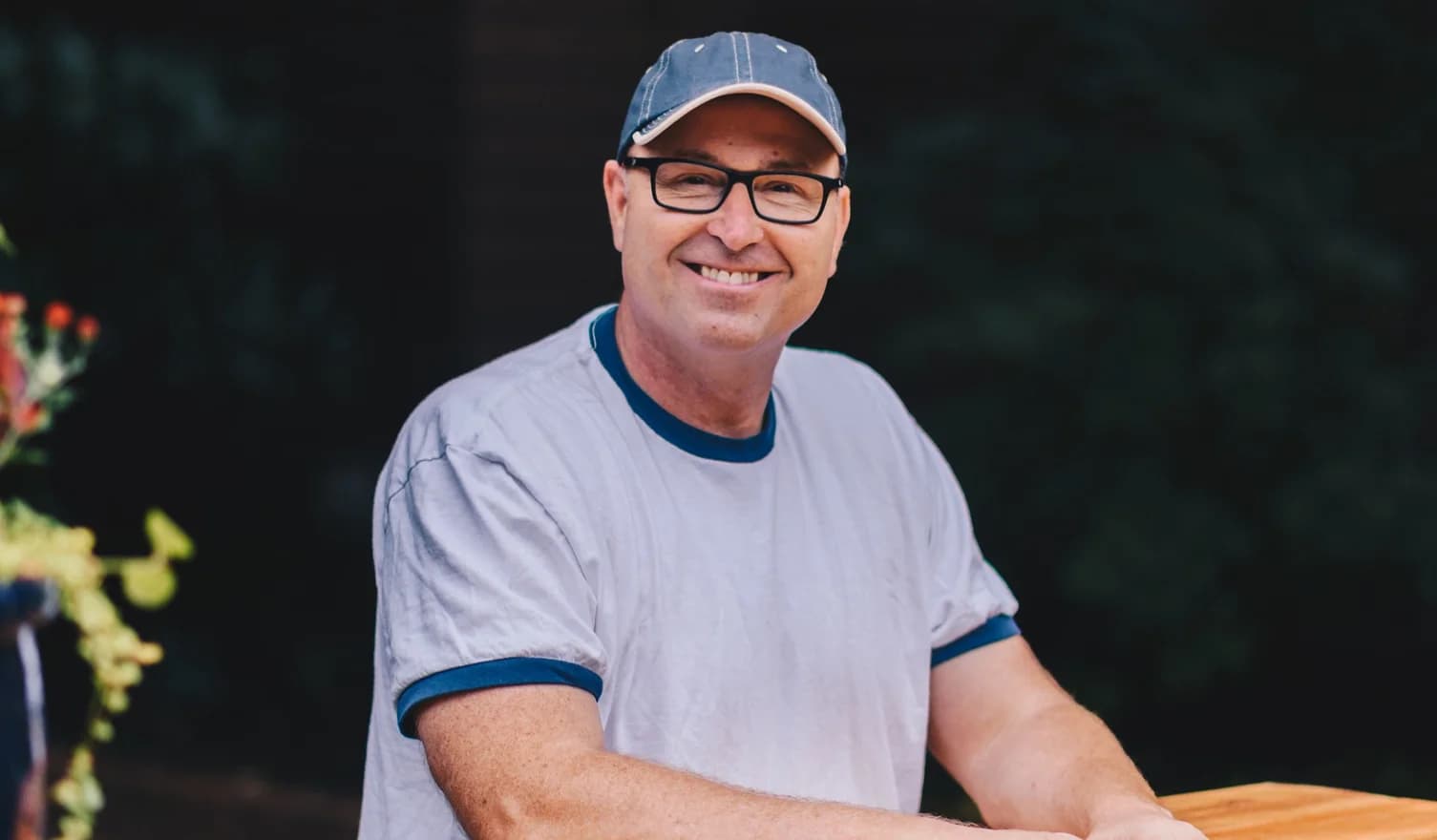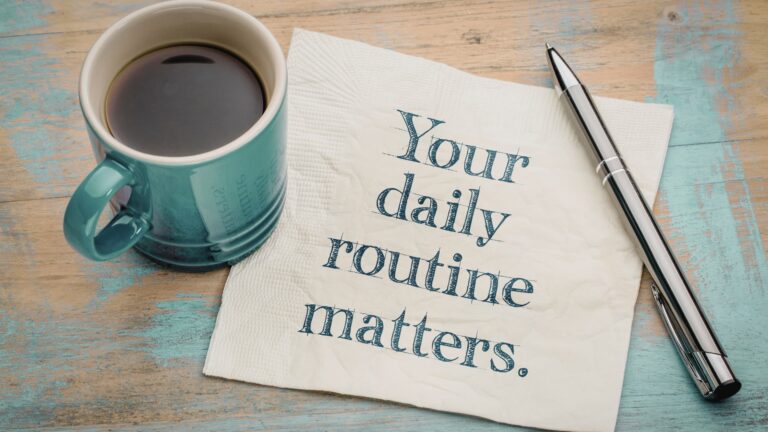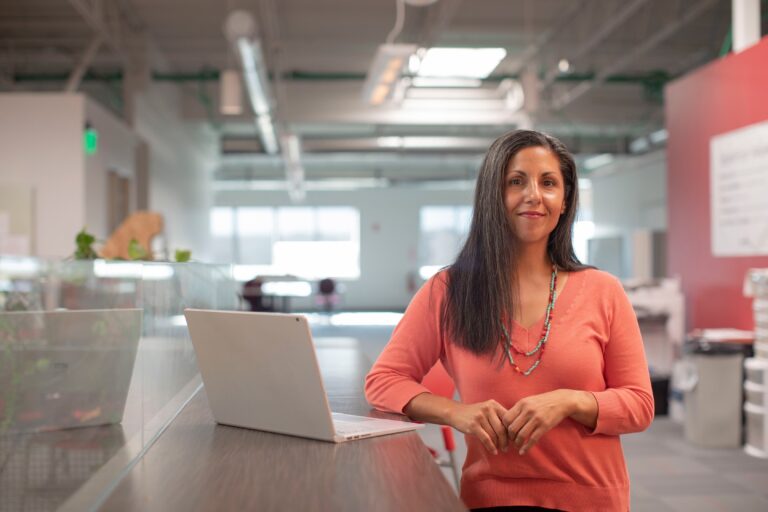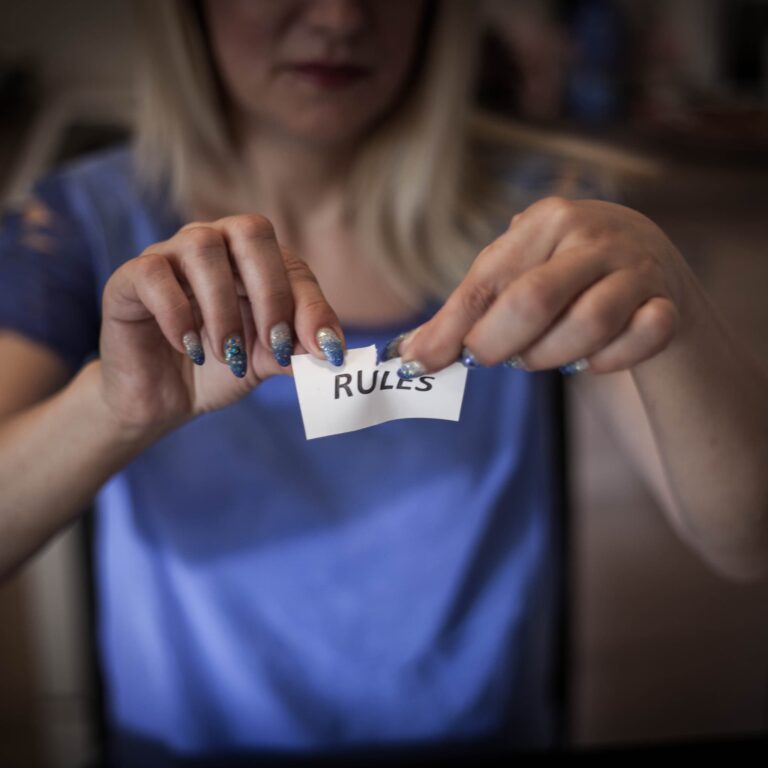Embrace Your Widow DIY Skills with Rob Kenney
Widows must learn how to do lots of new things on their own after their partner dies and most of us turn to YouTube to figure out how to do it. If you’re ready to embrace your widow DIY skills, you need to know about Rob Kenney, the creator behind the immensely popular, Dad, How Do I? YouTube channel.
Rob turned his personal hardships into a beacon of hope for millions. He candidly opens up about the void he experienced after losing his parents at the tender age of 14 and how his older siblings stepped in to guide him through life’s challenges.
With over 4.5 million subscribers, Rob’s channel has become a testament to the power of his wholesome “how-to” videos where Rob’s burning desire to be the father he never had shines through.
Listen to the Full Episode
Links + Resources From This Episode
This post contains affiliate links. Please read our affiliate policy for more information.
- Rob’s Dad How Do I? YouTube channel
- Rob’s book Dad, How Do I? Practical ‘Dadvice’ for Everyday Tasks and Successful Living
Episode Transcript
Melissa: Hi, and welcome back to another episode of the Widow Squad podcast. I’m your host, Melissa Pierce, and today we’re going to share an episode from the vault.
Back in 2021, I had the pleasure of chatting with Rob Kenney. You might already know him from his immensely popular YouTube channel, Dad, How Do I? With over 4.5 million subscribers to date, Rob’s channel has been a true beacon of light for so many people. He offers practical and heartfelt advice on various life skills with a caring and compassionate touch. Whether you’re looking for guidance on tying a tie or just needing some words of wisdom, Rob’s channel is the place to go, especially for those solo parents out there raising kids on their own.
Let’s get to it.
Melissa: Our special guest is Rob Kenney. Rob started his Dad, How Do I? YouTube channel in April of 2020. He thought he would help 30 or 40 people learn some basic skills. And a month and a half later, his channel went viral and quickly grew to over 1 million subscribers.
Welcome to the show.
I’m so glad you’re here, Rob.
Rob: Yeah, thanks for having me on, Melissa. I appreciate it.
Melissa: So, tell us a little bit about yourself and your story and how you got to where you are now.
Expanding Horizons: Rob Kenney’s Vision for Dad, How Do I?
Rob: Yeah, I don’t know where to begin, but I’m one of eight kids. I’m number seven and when I was 14 years old, my dad came home and said he was done raising kids and my mom was not able to take care of us at that time. It’s a fairly complicated story, but my mom was struggling with anxiety. And in those days, and I share about this in my book, the therapy wasn’t readily available, and so my mom didn’t get the help she needed, so she turned to alcohol.
Then my parents relationship kind of fell apart and my mom wasn’t able to take care of us so my dad got custody of us. He didn’t really want us, I don’t think, but he felt like it was the right thing to do. So he got custody of us, loaded us up with groceries on the weekends, and then he’d be gone for a week at a time. We kind of just fended for ourselves. These days, he’d be in big trouble for what he did.
Finally, he grew so callous that he just came home one day and said, “I’m done raising kids. If the older siblings don’t take care of the younger siblings, then I’m going to put them in foster homes.” Thankfully, I went to live with my brother. I was 14, my brother was 23, and he was newly married.
The YouTube channel kind of grew out of that. At a young age, I was determined to be the best dad I could be for my kids. We all fail. You do the best you can, and you pick yourself up and then move on and ask for forgiveness from your own kids.
So fast forward now. My kids are grown and out of the house. And, I was kind of looking for something to do. I’m a man of faith, and I was wondering what God would have me to do now. I reached my goal of raising good adults. They call me all the time. We still talk. We’re best friends now. So, the relationship has changed.
I was looking for something to do and I thought of this channel a couple of years ago, mentioned it to my daughter and she was like, “yeah, this would be something you need to do.” I kind of ran out of excuses when we were quarantined in 2020. So I did the “How to Tie a Tie” episode because it wasn’t fairly noncommittal. Took me about probably 15 minutes to really get it where I wanted it, and then I put it up. I’m amazed by the response and the platform that I’ve been given, to try to walk alongside people and help them with some basic tasks around the house.
Helping Widows and Solo Parents: Rob Kenney’s Journey to 4.5 Million Subscribers
Melissa: You mentioned how to tie a tie and that’s your very first YouTube. I was talking to another widow, who’s also a solo parent of two little boys, and she was telling me about your YouTube channel. I checked it out, and it was so overwhelming for me to watch it because it reminded me of a time when my two sons were, I think, 11 and 14 at the time that this event happened. My oldest comes in, “hey, mom, I got a school event. I gotta tie a tie. I gotta go in 20 minutes”. I have a lot of male help, like my brother and other people. But at that time, we gotta get this done quickly. I think my dad actually taught me how to tie a tie for a play production back when I was little. I was trying to do it on myself and slip it over my son’s head and it just got super frustrating. I’m googling Windsor knot and Double Windsor and all this stuff.
Finally, it was just so sad. We were going about our business and then suddenly you’re just made aware that this presence…Dave, my husband who died, is not there anymore and I can’t help my kid, and he’s getting really frustrated. I wish that there was a video like yours at that time. There were videos though, but they were really salacious, which was really weird. Like women tying ties. And at that point I didn’t care, whatever you need to watch to get this done, let’s just do it. So, he ended up tying his tie and I think actually somebody at school, one of the male teachers actually helped him perfect it. But yeah. What you do resonates with me as an only parent of kids. Thank you.
Rob: Yeah, it’s interesting because I actually heard that from several people, that same type of thing. Because it’s not only how to tie a tie, but it’s a reminder of the frustration of the situation that you’re in through widowhood or through divorce or through whatever. And I specifically remember one person telling me that about her son. And her son was in tears because it brought up the emotions of his dad not being there.
Melissa: Yeah, dad’s not here to help me with whatever. I’m looking forward to when you do, how do I fix a bike chain? I don’t know if you’ve done that one yet.
Rob: Yeah, so people have said that. And actually I was planning to do a bike series. I’ve got so many plans. I’m so busy though. It’s hard because I know I’m still working full time, because my wife and I are 57 and I don’t want to pull up short for retirement with my regular job. I haven’t let that go. This looks like it is a thing that’s going to stay because it continues to grow. My subscriber base, I’m at 3.5 million and growing. I didn’t trust it at first. When it went viral, I’ve lived long enough to know it could come up and be gone. My daughter helps me a lot with it. And we’ve tried not to take a left-hand turn where suddenly we’re doing something different or trying to sell you something or whatever.
So the sponsorships that I get, I’ve tried to keep them on brand, so to speak. But at the same time there are good quality products that I use and share with my own kids. Why wouldn’t I also share it with my audience? So again, trying to walk that fine line of making this thing sustainable too. I also have to think about our future and how to make this sustainable.
Just clarify for me, is it actually fixing the bike chain or is it just putting it back on?
Melissa: I think for me, it’s anything bike. The bike chain came off the thingies, the gears, I guess. See, I need a lot of help. Luckily, that was not a big emergency. My brother and my nephew lived really close by so I could call on them. I thought this might be a good skill for me and my kids to learn how to do.
Rob: Yeah, that is one that I was planning to do.
Melissa: Oh, good.
Rob: I didn’t know if you meant to, actually, fix a bike chain where it snapped and then you had to actually piece it back together. I have to be careful getting not to get too in the weeds. I want to try to keep stuff fairly basic.
Melissa: Or maybe a flat tire on a bike or something. I don’t know if you’ve done that. Anything mechanically related would be awesome.
Rob: My next one, actually, I’m going to be doing a camping stove. I’m going to show you how if you’ve never camped. I’d like to do a camping series. I’d like to do a fishing series, too. I’m going to show people how to operate a basic Coleman stove.
Because camping is pretty cool. But if you’re intimidated, like, where do I even begin? Okay, well, let me just show you. This is because a stove is kind of important if you’re camping to cook your meals. Anyway, that’s my next video coming out.
Melissa: When you have these ideas of what you want to show or film on your YouTube channel, do you go back to things that you talked to your kids about?
Rob: Yeah, we’ve tried to, and I talked to my daughter. We do actually occasionally, poll people asking what would be helpful. We’ve been keeping track of all that stuff and trying to figure it out. I don’t want to spend three months just on camping stuff.
Also, this week I’m actually starting off a Friday American football series. Just a fun thing where it’s five minutes and I’m going to show you how football works, American football. Because people said, “what are all the rules? I don’t understand.” And so I thought, on top of how to, I’m going to do Friday football. Then we tried to have fun with it too.
Melissa: Oh, my gosh. My husband was a football coach and I’ve gone to so many games. I’ve watched so many and I still don’t get it.
Rob: Yeah. We’ll start with a football field. And then we’ll build on that, especially since football season is starting. Now you have preseason going on. And so, I think if I could kind of build people up to where you can learn at least the basics, because there’s a lot of rules, there’s a lot to it.
I’ve played football since I was a kid and I take it for granted that people know the rules. A lot of people don’t.
Melissa: I know some of your videos are more skewed, stereotypically male, but I also see that you’re also bringing in, like “How to Make Biscuits” Are you going to do more?
Rob: Yeah, absolutely, because I’ve had people say, “that’s mom’s job.” Or, how to wrap a present at Christmas is a mom thing. Well, why limit yourself? I understand you only have so much time in the day, and as a husband and wife, you take on different roles and, okay, I’ll do this and you do that. But I don’t like the excuse of, I don’t know how to do that.
Well, you should learn that. You should learn how to do it. You might not be the greatest cook, but at least you’re not left not knowing how to do stuff, because I always did that, and I think it’s interesting to learn how to do things.
I remember baking my mom’s cookies for the first time, and they came out pretty good. I was like, hey, I can do this. And then my pumpkin pie, I did a pumpkin pie video. And yeah, it’s kind of fun to branch out into all these different areas.
Melissa: Now, have you ever done one where you didn’t actually know how to do something, but you learned it before the video?
Rob: No, I haven’t got to that point yet because I think I’ve got enough material for probably another four years. But, I wonder about, okay, am I going to get to a point where I’m going to start learning things so that I can show it? Maybe, I don’t know. We’ll cross that bridge when I get to it.
I’m trying to do one “how to” a week at this point. And maybe I’ll get to more if I am able to leave my job, but right now, one a week. So camping, fishing, how to tie a hook…I don’t want to have it be a 45-minute video of all things fishing. You might just need to know how to tie the hook, or you might need to know how to net the fish, or you might need to know what type of swivel to use. There are so many different things and I want to keep those in shorter bites because of people’s attention span. I get to see the numbers and I’ll put out a 20-minute video and it’s like the average watch time is 1 minute 30.
Self-Care and Success: How Rob Kenney Balances it All
Melissa: Wow, it sounds like you’re very busy. You have your job and then your YouTube channel and you’re interviewing all over the place. For me, self-care was a huge way to move forward in life. So, I’m going to ask you, do you have any particular self-care practices or things that you do when it’s so hectic to kind of bring you back to you?
Rob: Yeah, I wrote an article for Fatherly magazine. I put this up on my channel not that long ago because this thing came at us fast and hard and it was like, oh my goodness, we didn’t plan on this and now what? It was hard emotionally, so I did an article and they asked me what my take was on the last year. That’s what they asked. And so I said, “well, I use the letters from TAKE, as far as how I’ve been able to kind of process it.” The T stands for being true to myself. At the end of the day, I’ve got to live with myself and as a man of faith, I had people saying, “don’t say God bless you at the end of your videos.” But you know what? It’s who I am, though and I have to be true to myself. At the end of the day, because again, I have to live with myself. If this thing goes completely away and I’ve compromised myself, I haven’t done anybody any good. I’m left holding the bag.
Then the A is I can’t get ahead of myself because it’s easy to future trip and start thinking, oh, what if this or what if that. I’ve tried to keep that from happening. We all tend to do it. We tend to think bad things or think good things and then that doesn’t happen, or whatever. I’ve lived long enough to understand that isn’t usually helpful. I think it’s good to dream, and it’s good to set goals and that sort of thing. But you also just have to be careful with that.
Then the K is kind. I’ve got to be kind to myself. In the morning, when my channel went viral, the first thing I did was look at my phone and I got some new subscribers. Oh, what do they want? People making comments. I’m trying to reply to people, and I try not to do that now. I wake up and spend my time in the morning, my quiet time with the Lord. I try to spend a little bit of time, quiet time like you said, because the day will hit you fast. Pretty soon, if I’ve compromised that, then the day has gotten away from me.
And then the E is to also enjoy the ride, too, because it is pretty unique what I’m going through. I am trying to sit back and go, wow, I just talked to Ryan Seacrest, or I just talked to Kevin Hart. It’s pretty mind-boggling what my life has become compared to a year and a half ago when nobody knew who I was. It’s a little strange.
So, I’m trying to enjoy that without thinking too highly of myself.
Lessons in Compassion and Practicality: Rob Kenney’s Path to Publishing a Book
Melissa: It’s a way to really ground yourself and have integrity for yourself. I hope that’s in your book, right? The TAKE acronym.
Rob: So it’s on my channel, but it came after. I’d already written the book.
Melissa: Okay, well, let’s talk about your book – Dad, How Do I?: Practical “Dad-vice” for Everyday Tasks and Successful Living.
So, what was that like, writing the book?
Rob: Crazy. I got approached by a few publishers. I’m signing on with William Morrow, who’s a division of HarperCollins, because I really liked the guy that talked to me about what he planned for the book. And he gave me a lot of leeway because I’d like to share a little bit about my faith.
And he said, it’s your book, so we’ll let you do it, we’ll help shape it for you. But you’re welcome to talk about what you want to talk about.
So, the first part…there’s been confusion all over the place on the book, because I think Amazon doesn’t know where to put it. They’re calling it a DIY. And yeah, it’s a DIY because it does have some very practical DIYs in the back. There’s actually 58. I promised 50 DIYs and then I gave eight bonus ones because I figured if somebody didn’t like one, then here’s another one, here’s a bonus. I think it’s important in life to under promise and over perform.
I’ve always tried to do that because if you set a certain expectation, then you fall short of it. It’s like you’re called out on it. Just here you go, here’s some extra ones.
So that’s in the back part of the book. And honestly, there’s some good nuggets in there that I learned over the years that really have helped me financially and just other basic things to know. The first part, though, is about my story and I share about forgiving my dad, which was later in life, and how I forgave him before he asked for forgiveness. Because I think if you wait till somebody comes to you and asks for forgiveness, that may never happen.
It was in my best interest to forgive him so that I could move on, because I was hurting myself. I was chewing it over and over in my head. Meanwhile, life’s passing me by, so I needed to forgive him to let that go.
And then I shared the story of him finally asking for forgiveness and by that time I’d already forgiven him anyway, so it was really anticlimactic. Anyway, I share about each of my siblings because when our family fell apart, we relied on each other. I have some great siblings and I share a quality or character trait that I learned from them. Like my sister Mary, she saw the best of my parents and by that time she was out of the house, she was really instrumental in keeping the family together. She was writing letters to me, and I was just trying to cope. We have a lot of relatives in Kansas and she was trying to keep us all connected as a family because she saw that was important.
I worked my way through my brother, Tim. He questions authority and I think it’s healthy, not in a rebellious way, but you have to make your own mind up, right? You can’t just think, you said it so I believe it. Well, that doesn’t go very well when kids go off to college too, and people are questioning why they believe what they believe. So I think it’s important to be able to process it in your own mind.
And I talk about my brother Rick, who I went to live with. I talk about him having a good work ethic and being willing to do hard things. And then my sister Lori, I talk about being an encourager, how important that is. She’s a special ed teacher, and she was in the running for Teacher of the Year a few years ago in Washington state. She works with special ed kids, and she sets the bar higher than what the state says expects of these people.
Then with my brother Joe, I talk about hesitating too much. If you can gather a bunch of information, then let it sit there,, pretty soon, years have passed and you still haven’t made a decision. You got to jump in the pool. I share a story of Joe actually jumping in this pool of water below a waterfall when me and my brother Don were hesitating, and Joe just comes up and jumps right in. So I kind of compare that.
And then my brother Don, I share about living life with an open hand and being generous. It’s important to be generous. I share a story of him when I was younger. He was a senior in high school, and I was a sophomore, and I was living with my brother. Don lived on the other side of town, but he drove all the way past our high school, came over, picked me up, and drove back to school. It was special to me for a senior in high school to make that kind of sacrifice, because most seniors in high school sleep in up until the last minute. He had to make a sacrifice of getting up early, driving over. He didn’t do it every day, but I share the story of being thankful in the Washington weather on rainy days. It was nice when he came and picked me up.
What’s Next for Dad, How Do I?
Melissa: Are you doing any other projects besides YouTube and the book or is that keeping you pretty busy?
Rob: No, I got other things, too. There’s possibilities of a couple of different takes on a TV show for it too. So that’s also hanging out there. And then the sponsorships, too, trying to weigh that as those are coming to me. I’m trying to make sure that we’re doing something positive again. I think for the most part, everybody’s been really great. But at the same time, I’ve had people wanting me to promote a video game. And honestly, I don’t know what to do to promote a video game on my channel. It’s like, oh, no, dad left us. What did he come up with?
Melissa: I think all the kids know how to play video games.
Rob: Yeah, better than me, right?
Melissa: So I’m going to put you on the spot a little bit here. This is a question I normally ask the widows that I interview. But, if there was anything, any piece of advice you could give to an only parent who was struggling raising their kids, what would you say to them?
Rob: Yeah, that’s tough. My heart goes out to people in that situation. I’ve been on other podcasts where they’ve asked me that same question. I was like, can you give me a softball question?
That’s a hard question, honestly. I guess you’d call it a predicament, a situation that people find themselves in. I would encourage people to reach out to other people. Don’t be embarrassed to think that any question is a stupid question. But, I know myself, even not knowing simple tools or whatever and going to the hardware store and being intimidated by that. But after a while, you get over it, and it’s like, oh, well, I’ll never see that guy again anyway.
So ask and find out. And then you build on as much information as you can. I think it’s important to not be afraid to ask questions, because when people achieve something, it’s surprising how much they’re willing to tell you about how they got to where they are. We kind of maybe put them on a pedestal and think, I’d be embarrassed to ask them. But people, for the most part, like to talk about themselves. You can ask people you admire, if you just ask it in a respectful way, how they did what they did.
Melissa: Yeah, because you have a journey. I have a journey, and mine was ten years having certain wisdom and experience around raising two boys and being a widow and then remarrying. And I think, like you, I want to share how I got here, because it was not pretty to get to where I am now. It was pretty ugly, and I suffered. I don’t want anybody else to suffer as much as I did. So if I could make somebody’s life a little bit easier I would, just like what you’re doing.
Rob: Exactly. Like what you’re doing. You’re walking alongside people and saying, “hey, you can get there.”
Melissa: Yeah. You’re not alone.
Rob: Right.
Melissa: Well, Rob, I know you get asked this a lot, too. I think we’re going to go ahead and wrap this up with a dad joke or two, if you wouldn’t mind.
Rob: Yeah. I use these a lot because they’re kind of my favorite, so, if people have heard them before I apologize, but these are the ones I like. So an antenna and a satellite got married. The wedding wasn’t much, but the reception was incredible.
Melissa: Nice. Have you made any of these up?
Rob: I’ve made a few. That one wasn’t. I didn’t make that up.
Melissa: Maybe one more. I could use another laugh.
Rob: So, let’s see. A short fortune teller escapes from prison. He’s a small medium at large.
Melissa: Okay, I’m going to remember that one. I think that might go over pretty well. Oh, gosh. Well, Rob, it’s been a pleasure. I really love how you’re showing up in the world and changing lives.
Rob: Yeah. Thanks for having me on, Melissa. I feel blessed to be given the platform to try to do good because we need it. Some simple kindness. It goes a long way.







